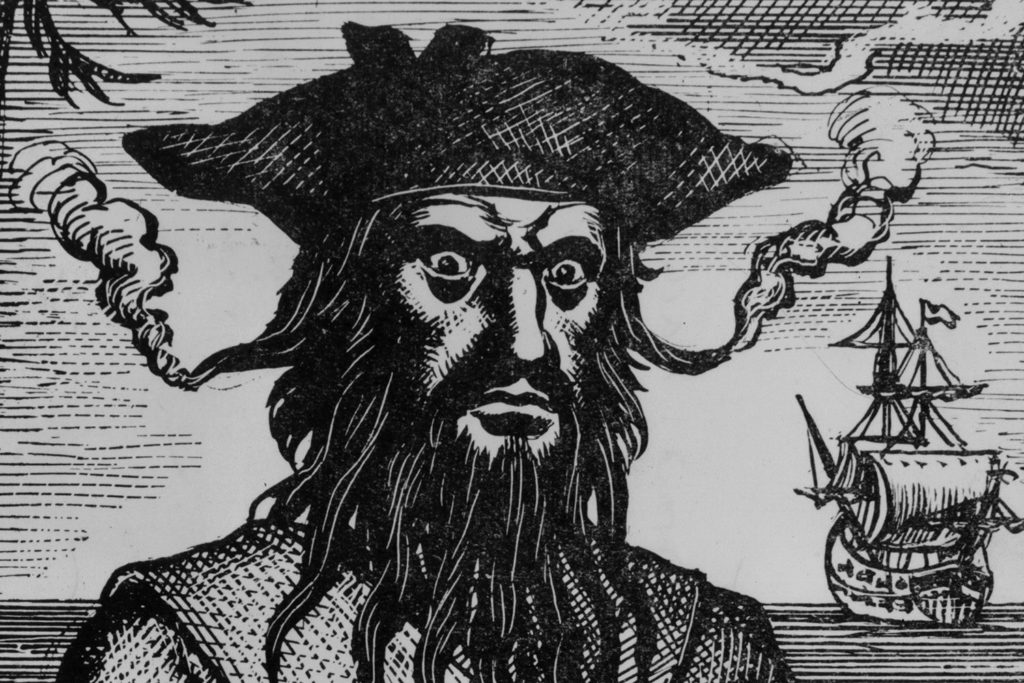When most of us think of treasure, we think of Pirates. It was not long ago that Pirates were among the most feared men who walked the earth. Edward Teach, a young privateer in the English Navy in the early 18th century, would rise to the pinnacle of infamy. Captain Teach is said to have distinguished himself in the French War as commanding great courage and boldness.
In the Spring of 1717, Teach left the Navy and began his career of piracy in the Caribbean. Benjamin Hornigold, a pirate friend of Edward’s and also his partner in leaving the Navy, awarded the young pirate with his first ship which Harnigold had captured, Queen Anne’s Revenge (as Edward called it). It was with this ship that Edward lead an extensive campaign. Edward and his crew journeyed throughout the Carribean and along the coast of North America, torturing, stealing, and making a name for himself as one of the most fearsome pirates the world has ever seen.
In addition to these heinous acts, Edward would develop a personal image that would strike fear into many a sailor traversing the Atlantic ocean. Edward had a dark black beard which was “extravagant length” and came up to his eyes in breadth thus earning the nickname “Blackbeard.” Some accounts depict him as having the “Look of Fury from hell.” Despite his fearsome demeanor and highly devoted crew of 300, Blackbeard’s reign was short-lived. On November 17, 1718 Blackbeard engaged in battle with a Navy ship. Commanded by Lieutenant Maynard the crew engaged in fierce hand to hand combat with the Pirates. Blackbeard and Maynard entered into a sword fight. It was then that Blackbeard received (by some accounts) an upward of twenty gunshot wounds.
The life of the notorious Pirate Blackbeard reveals to us many truths about the human endeavor. First, it displays that treasures stored in this life are fleeting. Men such as Edward Teach go to insurmountable lengths and commit uncommunicable atrocities, all for the sake of material treasure. Second, it reveals the nature of treasures of this world. The treasures which Edward sought outlived him. The joy that treasure promised was not only momentary, but Edward never truly experienced it. Men are often so driven by the wanting desire that they overlook the value of having.
While I don’t condone Piracy by any means, the life of Blackbeard demonstrates that the allure of riches will never be tamed. We are helpless in ourselves to overcome the roaring lion of desire. Like fuel is to a fire, treasure is to desire. The more we have, the more we think we need. Now let me digress and tell of a treasure which is insurmountable in value, and sufficient in quenching even the deepest longings.
“The kingdom of heaven is like treasurehidden in a field, which a man found and covered up. Then in his joy, he goes and sells all that he has and buys that field.” Matthew 13:44 ESV
In this parable, Jesus relates the Kingdom of heaven to a treasure hidden in a field. One of the key features of colonial piracy was the burial of treasure. Clearly, Jesus is not speaking out of context to this, however, it is important to note that men tend to bury what they find to be exceedingly valuable, ensuring the security of the treasure. Thus, when the man discovers the treasure he covers it up and sells everything he has and buys that field. The man see’s the great value in the treasure. In fact, he is so confident in it’s worth that he sells everything he possesses in order to obtain the land on which it resides. Jesus is demonstrating that the Kingdom of God is of such a value that any who truly understand it’s worth will not have second thoughts about giving up all for the sake of obtaining it.
The true beauty of the treasure of the kingdom is that it comes not by possessing something, but by selling all and being possessed by someone. When we are born of God, we become children of God and if children of God, then we are joint heirs with Christ (Rom.8:17).
Like dichroic light reflecting off the same crystal with various colors, so Paul is displaying that the call to follow Christ has various implications. He does so by using the Greek word δοῦλος throughout his writings. In the truest sense of the word, this is used to describe a slave or a servant. When God grants us faith we not only become his children, but we are also called to be his servants (slaves). While this may seem to be in direct opposition to our views of treasure, the Psalmist affirms this by saying:
“For a day in your courts is better than a thousand elsewhere. I would rather be a doorkeeper in the house of my God than dwell in the tents of wickedness.” -Ps.84:10
Through the lens of the world treasure is gain. Through the lens of the Gospel treasure is sacrifice. To receive the riches of this world is to lose the glorious riches of His grace. To receive the glorious riches of His grace is to receive everything. Greater than the richest of earthy kings is the poorest servant of the most High. May we continue to grow in our understanding of the incredible value of the Gospel.

Leave a Reply